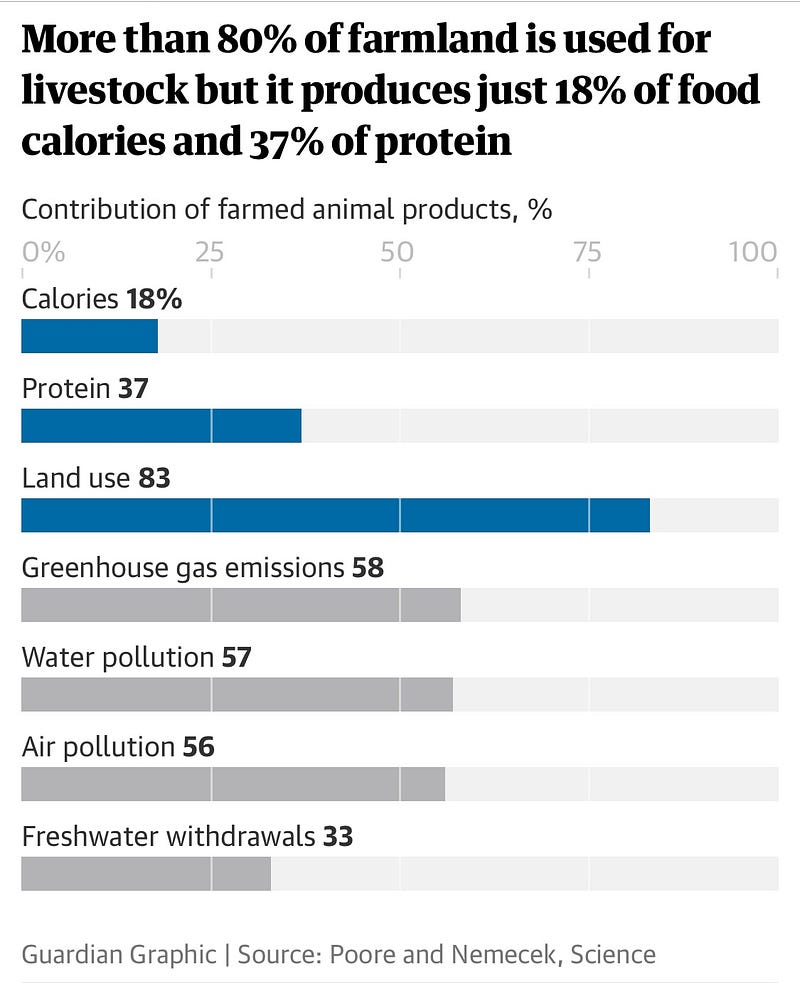As a lifelong — active — ethical vegan I have found it useful to adopt some of the wisdom found in spiritual traditions, so, for example, if you take pride in the progress you are making, you have failed. I saw how that directly applies to taking a stance against animal suffering, ill-health, and ecocide.
But I also know that reducing animal suffering, eating a diet that isn’t going to kill me in the end, while underwriting the mass destruction of the environment, is a virtue — it’s just not a justification for bragging. To live a good life today requires you to go against almost every tidal current set in motion by the culture we have received and magnified. Culture is, after all, a shared construct, and I prefer to share — but not impose — something different than the current norm.
That said, there are some points of yours that I’d like to offer a different take on — based on my half-century of being vegan. (That’s validating what I have to say, not thumping my chest)
The first is that quote up there. Kicking dogs is not a widespread cultural phenomenon, so it’s a really bad analogy. Eating meat, supporting animal cruelty, underwriting environmental destruction and climate change are very widespread. How widespread? Well, here’s a recent graph relating to the UN’s IPCC reports of last fall:

Those are vertigo-inducing numbers. The point here is that adopting a vegan lifestyle is an immense positive for the planet, its occupants, and you — in comparison to what you would otherwise be doing. This leads to the second point I’d like to make:
All life impacts their environment; whether those impacts are positive or negative depends upon whose crystal ball is being used to weigh the effects — and I use “crystal ball” here because, although we know a great deal, it is undeniable that we still don’t understand enough to save our species from its immanent failure (which appears to be the scientific consensus now).
In this situation we are like our modern medical doctors who treat one disease and kill the patient via the treatment’s effect on their health — not intentionally, but due to incomplete knowledge, and perhaps a bit too much hubris at times.
The one thing that each of us can do is to adopt a vegan lifestyle, reducing — by more than half — our negative impacts on the environment. To say that veganism isn’t good, as you do, is to obfuscate ecocide with the miasmatic myth that humans are bad, bad, bad by nature. Ecocide is a choice, which is why there are global efforts to include it in the short list of crimes against humanity.
To be vegan today is less and less an apostatic stance, as it becomes more normal in our culture. But you cannot overlook the fact that a vegan lifestyle is not a neutral position in the history of the human race. If it were, the majority of us would be vegan. If it were, we wouldn’t find spiritual traditions mandating their adoption thousands of years ago.
Which brings me to my last point: mandates don’t work. Not for spiritual traditions, nor for cultures in general. And social shaming (inducing guilt) obviously isn’t working for us today — imagine if we could just shame everyone into adopting a vegan lifestyle today, dropping greenhouse gas emissions 58% tomorrow. Hey! Problem solved. I was involved for decades in organized efforts to “convert” people to a vegan lifestyle, or “convince” them that it is good; but the one thing we failed to do was show people how to adopt one. To wit: how do you cook delicious vegan food on an everyday basis? What do you use? How do you use it? Where do you get the ingredients you need?
Those may seem like stupid questions today because of the wealth of shared knowledge that has been developed over the past fifty years, but for the most part, people are still in the dark about how to do it at home — remember, I said “delicious” and “vegan”. Exposing someone to familiar food that they presently consume, which is delicious, and vegan, is all that is needed to spark their interest. The events unrolling now — according to the scientific consensus — will provide the impetus needed to change things. Education will enable the change. First-hand experience will convince those in doubt of the possibility of joining in. After that, its just a matter of whether or not our ingrained cultural traditions will kill us.
